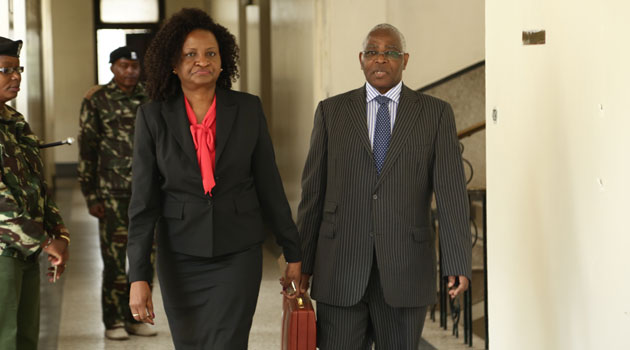
While Ringera has described the work the committee did as the ‘high noon’ of his career, what could be described as an ‘aggressive’ Judicial Service Commission has differed/KEVIN GITAU
NAIROBI, Kenya, Sep 6 – The ghost of his anti-corruption past haunted aspiring Chief Justice Aaron Ringera when he appeared before the Judicial Service Commission on Tuesday morning, for what turned out to be a gruelling four-hour interview.
In particular, the role he played in the 2003 corruption purge in the Judiciary – dubbed a ‘radical surgery’ – that saw 23 judges, 82 magistrates and 43 paralegals sent home on the strength of a report filed by a committee led by Ringera who had by then served both as a judge and anti-graft czar as head of the Kenya Anti-Corruption Authority and later the Kenya Anti-Corruption Commission.
When he appeared before the JSC on Tuesday, Ringera referred to it as the ‘high noon’ of his four decade long career given the courage it took, as he put it, to investigate his peers and superiors.
An assessment which appeared to incense the robe wearers on the interview panel who took issue with the fact that those adversely mentioned in the report were not accorded the opportunity to defend themselves, in keeping with the laws of natural justice, before being shown the door and having their names ‘leaked’ to the press.
This, Ringera conceded, was regrettable but refused to assume blame for the leak saying he advised the Chief Justice at the time, Evan Gicheru, that the names of the judicial officers of questionable integrity should be held in confidence until such a time as they could be faced with and respond to the charges against them. “I was utterly shocked that names would be splashed around… I said where has the press gotten this information?”
Appellate Judge Mohamed Warsame however took issue with Ringera donning a cloak of propriety and read back to the judge his observation, at the time, that the aforementioned court officers were, “infected with the corruption virus.”
“Strong and inappropriate language,” Ringera conceded, in retrospect.
Strong and inappropriate were perhaps too tame a description for what Warsame called, “judicial homicide” that brought about an “extrajudicial,” end to careers; at the hands of the Ringera led committee.
“If I could do it again,” he said more than once, “I’d do it differently.”
“Others have never forgiven me. (I) met one from a bank, he looks the other way, I look the other way. At the airport… I have told you my brother,” he said to Warsame. “I have lived an extraordinary life, a life of pain, or sorrow, but that it the cross I bear.”
The life of an anti-corruption czar, he repeated over and over, is not one he would wish on anyone. “I’ve gone through hell for the service of this country.”
Ringera also expressed regret at being “used” as a blockade to multi-party democracy when he filed a suit in 1992 to block the Law Society of Kenya from agitating for the same.
“We were in a dictatorship… I think we were used for political purposes, to put brakes or a halt on democratic development. That I regret completely. I was approached by the late Mutula Kilonzo, the late Justice Zaccheus Chesoni that Society is in danger, the Students’ Union has been proscribed,
President Moi was proscribing societies right, left and centre, can we do something about it and I fell for it and I’m sorry about it. I regret very much that aspect of my life.”










































